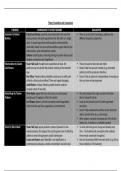Summary
Summary Media Theories Comparison and Evaluation
- Module
- Theoretical Framework
- Institution
- WJEC
This document lists all the set theories for the course and evaluates/critiques them and compares the theories together - this particularly useful for the long form component 2 questions and helped me to get an A* on my paper
[Show more]



